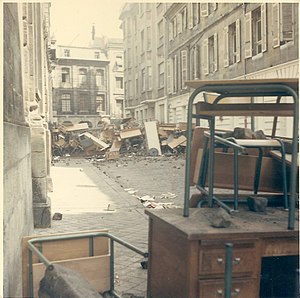1968:反叛的年代 山東畫報,2003
Where has all the rage gone? | 1968: the year of revolt |
- Croker, Richard (2007), The Boomer Century, New York: Springboard Press
- Kurlansky, Mark (2004), 1968: The Year That Rocked the World, New York: Random House Publishing Group
Protests of 1968 - Wikipedia
1968: the year of revolt | World | The Guardian
2018/11/06 — 1968: the year of revolt · The Beatles' White Album captured the spirit of '68, but it's right for 2018 too · When the photographer who shot the Beatles captured the moment the Vietnam war came home · Prague 1968: lost images of ...
Everyone to the barricades | 1968: the year of revolt | The ...
2008/01/19 — France's journey from 'serenity' to near revolution in the first few weeks of May is the defining event of '1968', a year in which mass protest erupted across the globe, from Paris to Prague, Mexico City to Madrid, Chicago to ...
| Protests of 1968 | |
|---|---|
| Part of the Cold War | |
 Barricades erected in Bordeaux, France, in May 1968 | |
| Date | 5 January 1968 – 29 March 1969 (1 year, 2 months, 3 weeks and 3 days) |
| Caused by | |
| Goals | |
| Resulted in | Social revolutions |
The protests of 1968 comprised a worldwide escalation of social conflicts, predominantly characterized by popular rebellions against the military and the bureaucracy.
In the United States, these protests marked a turning point for the civil rights movement, which produced revolutionary movements like the Black Panther Party. In reaction to the Tet Offensive, protests also sparked a broad movement in opposition to the Vietnam War all over the United States as well as in London, Paris, Berlin and Rome. Mass movements grew not only in the United States but also elsewhere. In most Western European countries, the protest movement was dominated by students. The most spectacular manifestation of these was the May 1968 protests in France, in which students linked up with wildcat strikes of up to ten million workers, and for a few days the movement seemed capable of overthrowing the government. In many other countries, struggles against dictatorships, political tensions and authoritarian rule were also marked by protests in 1968, such as the beginning of the Troubles in Northern Ireland, the Tlatelolco massacre in Mexico City, and the escalation of guerrilla warfare against the military dictatorship in Brazil.
In the countries of Eastern Europe under communist parties, there were protests against lack of freedom of speech and violation of other civil rights by the Communist bureaucratic and military elites. In Central and Eastern Europe, there were widespread protests that escalated, particularly in the Prague Spring in Czechoslovakia, in Warsaw, Poland, and in Yugoslavia.
Background[edit]
Multiple factors created the protests in 1968. Many were in response to perceived injustice by governments—in the USA, against the Johnson administration—and were in opposition to the draft, and the United States' involvement in the Vietnam War.
沒有留言:
張貼留言